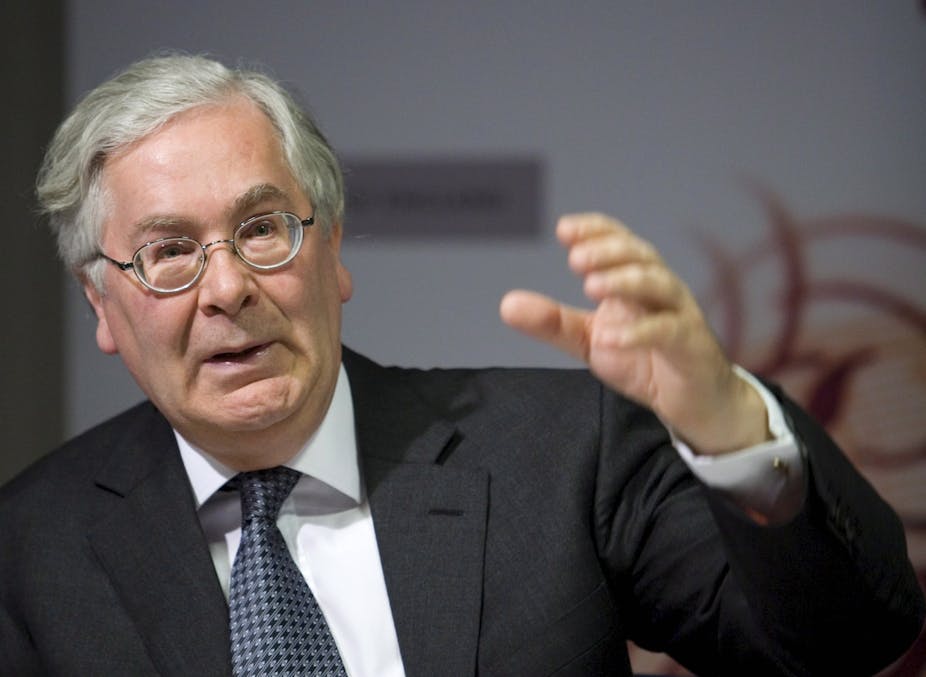Bank of England Governor Mervyn King has called on British banks to lift their capital reserves, hold off on paying dividends and cut bonuses amid growing fears about Europe’s economic stability.
King’s warning comes days after the US Federal Reserve and most of the world’s other major central banks moved to lower the cost of credit for banks by cutting the interest rate on US-dollar denominated debt.
Melbourne Business School’s Sam Wylie examines the likely impact of the measure and the next step forward for the world’s political and economic leaders.
Despite Mervyn King’s warning, can anything save the UK’s banks in the event of economic meltdown in Europe?
The British Banks went through an enormous shakeout during the first stage of the global financial crisis in 2008. Royal Bank of Scotland (RBS) was essentially taken over by the British government and Lloyds was drawn into a lot of trouble. HSBC and Barclays came through it relatively well.
This is situation you would see in any country where there is a massive financial crisis – the banks will fail unless they are backed by the government. That is just the nature of banking.
Banks are very fragile. What makes them so is that they borrow money short-term and lend money long-term. That is not a failing of the banking sector – that is what we want banks to be.
They are a critical part of the monetary system. They turn liquidity into credit. They raise deposits as short-term money and also get money from short-term money markets – the inter-bank market and the repo market.
They have their own equity and long-term bonds, but for the most part they have very short-term money as their liabilities and have long-term things, like mortgages and commercial loans, as their assets.
That makes them critically unstable, but that is what we want them to be. We want them to be the mechanism for turning liquidity into credit as part of monetary policy.
If a financial crisis comes along and people won’t lend money to the banks, then the banks will fail unless a lender of last resort steps in to fund that gap. That is true of all banks at all times.
Will this week’s move by central banks to keep credit cheap ensure the flow of short-term capital remains steady?
I interpreted those measures as meaning that a illiquidity is slowly emerging. The whole problem in Europe is a slow-motion train wreck.
The banks are being squeezed by their inability to raise money in the short-term markets. When the US Fed said that it would lower the cost of short term currency loans that they have in US dollars with other central banks, what they’re doing is easing the alternative access to liquidity for European banks. This means that they don’t have to rely so heavily on the repo market and inter-bank market.
These banks have lots of long-term US-dollar assets, and they need to finance with short-term USD liquidity. They’re getting squeezed in the repo market because people don’t trust the value of those assets as collateral, and they’re getting squeezed in the inter-bank market because the banks don’t trust each other anymore.
The Fed and the other banks are basically saying: “We’re going to provide plenty of US dollar liquidity, so everybody should just relax”. That is the nature of liquidity crisis. Once the central banks step up to the microphone and say there will be as much liquidity as is required, then everybody does relax and liquidity begins to flow again.
Markets responded positively to the move, but is there enough confidence to guide the global economy through this next period of adjustment?
Confidence that there will be enough liquidity is very important. People will hoard liquidity if they feel that it is about to become scarce. That means that they will draw down on their lines of credit and stop making payments.
Confidence that there will be enough liquidity is self-solving. If people are confident, they do make payments and they allow liquidity to flow.
There has been a boost in the market to do with the International Monetary Fund (IMF), too. People were hoping in Europe that the European Financial Stability Fund would be able to raise a lot of money – potentially a trillion euros.
Now it look like it is going to be more like 750 billion euros. That has damaged confidence that European governments would be able to refinance themselves and that there would be enough demand for their bonds.
What has happened in the past few days is that the IMF have stepped up and said that the G-20 is looking at putting more funds into IMF. This would mean that the IMF could step in and buy more European bonds.
So the feeling is that European countries – and Germany in particular – can get more bang for their buck out of the IMF’s balance sheet than through the EFSF.
There’s also less political difficulty for Germany in doing it through the IMF, because it gives less of the signal of Germany being resurgent in Europe and knocking everybody about.
If a lot of new capital goes into the IMF, then it may be a better vehicle that the EFSF to buy those bonds.

